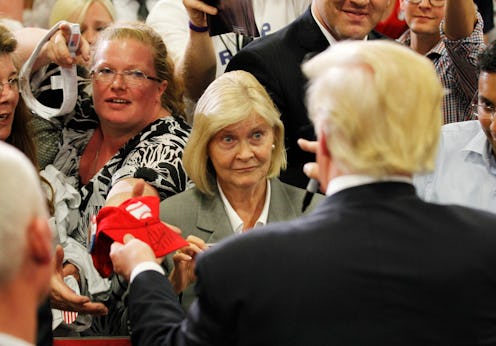News
What Happens If Delegates Don't Vote For Trump
We're about a week away from the Republican National Convention, where the GOP will officially nominate its candidate for president. Ostensibly, that candidate will be Donald Trump, as he won a majority of delegates in the primaries. But what if the delegates don't vote for Trump at the convention? It's a tricky question to answer, as it hinges on several decisions that haven't been made yet.
The overwhelming majority of the Republican delegates are bound. This means that they can't vote for whomever they want; RNC rules require them to vote for a specific candidate at the convention. With a couple of exceptions, delegates become bound to one candidate or another based on the outcome of that state's primary or caucus vote. Currently, around 1,447 GOP delegates are bound to Trump. That's a majority, and thus enough for him to win the nomination.
But what if, when it comes time for delegates to vote, Trump doesn't win a majority? There are two very different ways this could play out.
In one scenario, the delegates would enact a rules change earlier in the convention that would unbind the delegates. This is the strategy anti-Trump delegates are currently pursuing, and it's completely within the rules: The RNC's rules committee — which is essentially just a subset of delegates — does have to approve the final set of rules before the delegates vote on the party's presidential candidate. If a majority of delegates opted to unbind all of the delegates, none of them would be required to vote for Trump, and he'd likely lose the nomination.
That said, this probably isn't going to happen. According to TIME, a rules change of this nature doesn't have majority support among the Republican delegates, so unless a chunk of them are persuaded between now and the convention — which isn't impossible — a rules change isn't happening, and a majority of GOP delegates will remain pledged to Trump.
The more intriguing possibility is Republicans will end up "faithless delegates" at the convention. These are delegates who are required by RNC rules to vote for Trump, but break the rules and vote for someone else. And this is where we get into some uncertain territory, because it's not at all clear what will happen if faithless delegates attempt to swing the nomination to someone other than Trump.
On the one hand, the RNC has a rule stating that "the Secretary of the Convention shall faithfully announce and record each delegate's vote in accordance with the delegate's obligation under these rules, state law or party law." This is a reference to the fact that some states have laws that restrict how delegates can vote.
But what if party rules conflict with state law? The GOP's rulebook has no contingency for such a situation, which could arise quite easily. Furthermore, most legal experts agree that, state law notwithstanding, political parties have final say over their own functioning, and the Supreme Court has affirmed this. This means that, ultimately, nobody really knows what will happen if there are faithless delegates at the Republican convention.
If Republicans don't change the rules, and all of the delegates vote as they're bound, Trump will be the nominee. If the party changes its rules and unbinds its delegates, Trump probably won't be the nominee. And if the party doesn't change its rules, but the delegates break the rules and vote for someone other than Trump? Well, in that case, we'll just have to wait and see.
